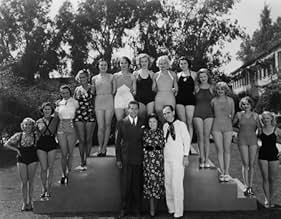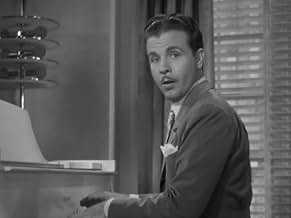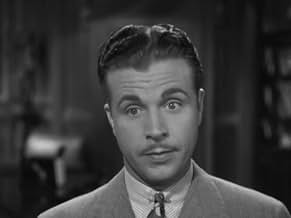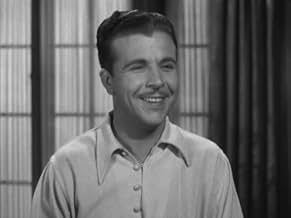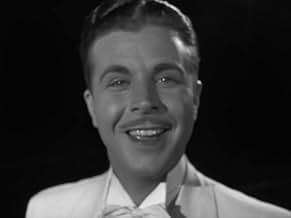IMDb-BEWERTUNG
6,4/10
1298
IHRE BEWERTUNG
Füge eine Handlung in deiner Sprache hinzuWhen two investors inform an opportunistic dancer that they can't fund an elderly stage producer's production, she suggests they get an insurance policy on the producer's life.When two investors inform an opportunistic dancer that they can't fund an elderly stage producer's production, she suggests they get an insurance policy on the producer's life.When two investors inform an opportunistic dancer that they can't fund an elderly stage producer's production, she suggests they get an insurance policy on the producer's life.
- Für 1 Oscar nominiert
- 2 Gewinne & 1 Nominierung insgesamt
Charles D. Brown
- Hugo
- (as Chas. D. Brown)
William B. Davidson
- Andy Callahan
- (as Wm. Davidson)
Bobbie Adams
- Chorus Girl
- (Nicht genannt)
Iris Adrian
- Verna
- (Nicht genannt)
Empfohlene Bewertungen
Dick Powell is an insurance salesman who sells a million dollar policy to a producer in "Gold Diggers of 1937" also starring Joan Blondell, Victor Moore, Osgood Perkins and Glenda Farrell.
Due to bad investments by his staff, producer/hypochondriac Hobart (Moore) has no idea that the show he's planning to put on can't be financed. The men responsible for losing his money get Rosmer (Powell), an insurance salesman, to sell Hobart a $1 million policy, figuring he won't live and then the show can be done.
The funniest part of the movie is when Rosmer tells his fellow insurance salesmen of his coup and then announces that Hobart is 59. "59!" one of them exclaims. "He'll never pass the physical." "We sold a policy to a 68-year-old last year," someone says, "and he passed." "Yeah," the reply is, "passed OUT."
Interesting that 59 was thought of as more than 79 in the '30s. Coincidentally, Dick Powell himself died at the age of 59.
It's Rosmer's job to keep Hobart alive and it's his partners' job to help him to the pearly gates. They send in Glenda Farrell to break his heart, figuring he'll want to end it all, but things don't work out as they planned.
They throw him in a pool at a party; he doesn't catch cold, nor does he drown. It's actually pretty funny.
There are some pleasant songs which Powell sings beautifully, and a big Busby Berkeley number at the end, but I imagine as this is part of a series of "Gold Digger" films, audiences wanted something more.
The performances are good - chameleon Powell is a great, earnest salesman, Joan Blondell (who was either Powell's wife or about to become his wife) is adorable as a showgirl, and Moore is hilarious. Glenda Farrell is a real scene-stealer with her great line delivery.
Pleasant but not much as far as musical values.
Due to bad investments by his staff, producer/hypochondriac Hobart (Moore) has no idea that the show he's planning to put on can't be financed. The men responsible for losing his money get Rosmer (Powell), an insurance salesman, to sell Hobart a $1 million policy, figuring he won't live and then the show can be done.
The funniest part of the movie is when Rosmer tells his fellow insurance salesmen of his coup and then announces that Hobart is 59. "59!" one of them exclaims. "He'll never pass the physical." "We sold a policy to a 68-year-old last year," someone says, "and he passed." "Yeah," the reply is, "passed OUT."
Interesting that 59 was thought of as more than 79 in the '30s. Coincidentally, Dick Powell himself died at the age of 59.
It's Rosmer's job to keep Hobart alive and it's his partners' job to help him to the pearly gates. They send in Glenda Farrell to break his heart, figuring he'll want to end it all, but things don't work out as they planned.
They throw him in a pool at a party; he doesn't catch cold, nor does he drown. It's actually pretty funny.
There are some pleasant songs which Powell sings beautifully, and a big Busby Berkeley number at the end, but I imagine as this is part of a series of "Gold Digger" films, audiences wanted something more.
The performances are good - chameleon Powell is a great, earnest salesman, Joan Blondell (who was either Powell's wife or about to become his wife) is adorable as a showgirl, and Moore is hilarious. Glenda Farrell is a real scene-stealer with her great line delivery.
Pleasant but not much as far as musical values.
The next to last of the Gold Digger films finds Dick Powell as a rather unenthusiastic insurance salesman who'd rather be in show business, roped into selling an insurance policy to hypochondriac Broadway producer Victor Moore.
Moore's got bigger problems than imaginary illnesses. He's got a couple of crooked partners in Charles D. Brown and Osgood Perkins. They've taken money from Moore and put in some stock that went belly up. Now to get the money back they have a scheme to insure Moore and then maybe push him along into eternity. In fact they almost trip him into it during the film.
Joan Blondell is a former chorus girl now turned stenographer at the insurance company office and she gets her friends together with Powell and Lee Dixon from the company and they help Moore out.
Gold Diggers of 1937 doesn't have quite the madcap lunacy of the 1935 edition, but still there's a lot of entertainment there. Busby Berkeley gets only two numbers here to demonstrate is creativity, Let's Put Our Heads Together and the finale All's Fair in Love and War. Powell solos with With Plenty of Money and You and he duets with current wife Blondell in Speaking of the Weather.
Lee Dixon was a very talented dancer who graced a few musical films and then went east to Broadway and made his biggest splash as Will Parker in the original production of Oklahoma. Dixon died tragically young in 1953. I think he should have gotten some recognition from the Academy for having the nerve to go into this film playing a character named Boop Oglethorpe.
There was only one more round for the Gold Diggers as in their next film they went to Paris and it was ended after that. This version is entertaining enough, even if not up to 1933 or 1935.
Moore's got bigger problems than imaginary illnesses. He's got a couple of crooked partners in Charles D. Brown and Osgood Perkins. They've taken money from Moore and put in some stock that went belly up. Now to get the money back they have a scheme to insure Moore and then maybe push him along into eternity. In fact they almost trip him into it during the film.
Joan Blondell is a former chorus girl now turned stenographer at the insurance company office and she gets her friends together with Powell and Lee Dixon from the company and they help Moore out.
Gold Diggers of 1937 doesn't have quite the madcap lunacy of the 1935 edition, but still there's a lot of entertainment there. Busby Berkeley gets only two numbers here to demonstrate is creativity, Let's Put Our Heads Together and the finale All's Fair in Love and War. Powell solos with With Plenty of Money and You and he duets with current wife Blondell in Speaking of the Weather.
Lee Dixon was a very talented dancer who graced a few musical films and then went east to Broadway and made his biggest splash as Will Parker in the original production of Oklahoma. Dixon died tragically young in 1953. I think he should have gotten some recognition from the Academy for having the nerve to go into this film playing a character named Boop Oglethorpe.
There was only one more round for the Gold Diggers as in their next film they went to Paris and it was ended after that. This version is entertaining enough, even if not up to 1933 or 1935.
Busby Berkeley's films are the most concentrated tease in the history of movies. it is over an hour into 'Gold Diggers of 1937' before we get any real meat - an astonishing, gossamer-erotic Gatsby-orgy filmed in the manner of Riefenstahl, all glowing Aryan bodies with their glistening mammillae, and idealised framing; with the kind of multi-character cutting of a song Paul Thomas Anderson would borrow for 'Magnolia'; and a magnificent extended tap-dance leading to an agreeable Berkeley fancy, the huge male dancer hand-standing over a bridge of female arms like a fly evading a web - after two tantalising duets featuring Dick Powell and Ruby Keeler that threaten to explode into full-blown imaginative hysteria, but are cut short.
Of course, this is the Berkeley method - coitus interruptus - and our deferred gratification is mirrored in a plot where the hero must prove himself worthy of the heroine before he can have her; the final extravaganza thus functions as a sexual/marriage rite, concluding in a consummating kiss. And what an extravaganza it is - less overt than '1935', but full of fetishised phallic implements, swirling clitoral circles and rocking chairs. Against a sharp black background, our phosphorescent heroes play out their immemorial rites, the heterosexual struggle linked to war (and not to the men's advantage). This idea leads to some striking sequences, including a priapic cannon with a pair of adjacent ball-piles, and a scene of 'trench' warfare, where the skirted female soldiers in 'No Man's Land' triumph through a blitzkrieg of firearms and perfume. There is no way actual sex could ever be better than this.
It is traditional in celebrating Busby Berkeley movies to denigrate the plots as amiable, necessary time-passers before the visual disruption. I always find them highly entertaining, and '1937' has one of the best: an excellently plotted farce combining gold-diggers, an inept salesman, a hypochondriac theatre impressario and his corrupt sidekicks.
This fun plot is noticeable for two things - the extraordinary sexual honesty that persists in spite of Messrs. Hays' and Breen's best efforts: this is a Depression where a woman must prostitute herself for a meal, never mind a marriage; as Glenda Farrell says 'It is so hard to be good under the capitalistic system' (!). The film opens with Powell insisting on the link between financial security and marriage, and the glistening sea of gold moistening the opening credits certainly have a sexual force.
More enjoyable is the portrait of the two heels who try to kill their boss having lost all his money in a Stock Exchange scam, hoping to cash in on his insurance. this kind of plot is quite shocking in such a genre, and we are expected to laugh at various unsuccessful murder attempts (and we do: the whispers for help when they hurl JJ into the pool are hilarious). These are not cartoon villains but the kind of middle-aged, middle class men we might meet in film noir or the novels of Simenon, men whose souls have been made hard by routine, and the American insistence on success. They would have made good collaborators.
In 1933, the 'Gold Diggers' poignantly recorded the effects of the Depression: things haven't really improved four years later, but, significantly, the idea is emerging that if you throw enough razzmatazz, noise, bands and empty phrases at a problem it will go away. it's not for nothing that the two leads are an insurance man and an actress. Powell is amiable in a silly moustache, sillier name and a cheerful pessimism; Blondell is bubbly and serious and lovely as ever; the revelation, however, are Glenda Farrell, convincingly transforming from cynical modern woman to accomplice of scoundrels to loving wife; and Victor Moore, as the inimitable, whining, lonely JJ.
Of course, this is the Berkeley method - coitus interruptus - and our deferred gratification is mirrored in a plot where the hero must prove himself worthy of the heroine before he can have her; the final extravaganza thus functions as a sexual/marriage rite, concluding in a consummating kiss. And what an extravaganza it is - less overt than '1935', but full of fetishised phallic implements, swirling clitoral circles and rocking chairs. Against a sharp black background, our phosphorescent heroes play out their immemorial rites, the heterosexual struggle linked to war (and not to the men's advantage). This idea leads to some striking sequences, including a priapic cannon with a pair of adjacent ball-piles, and a scene of 'trench' warfare, where the skirted female soldiers in 'No Man's Land' triumph through a blitzkrieg of firearms and perfume. There is no way actual sex could ever be better than this.
It is traditional in celebrating Busby Berkeley movies to denigrate the plots as amiable, necessary time-passers before the visual disruption. I always find them highly entertaining, and '1937' has one of the best: an excellently plotted farce combining gold-diggers, an inept salesman, a hypochondriac theatre impressario and his corrupt sidekicks.
This fun plot is noticeable for two things - the extraordinary sexual honesty that persists in spite of Messrs. Hays' and Breen's best efforts: this is a Depression where a woman must prostitute herself for a meal, never mind a marriage; as Glenda Farrell says 'It is so hard to be good under the capitalistic system' (!). The film opens with Powell insisting on the link between financial security and marriage, and the glistening sea of gold moistening the opening credits certainly have a sexual force.
More enjoyable is the portrait of the two heels who try to kill their boss having lost all his money in a Stock Exchange scam, hoping to cash in on his insurance. this kind of plot is quite shocking in such a genre, and we are expected to laugh at various unsuccessful murder attempts (and we do: the whispers for help when they hurl JJ into the pool are hilarious). These are not cartoon villains but the kind of middle-aged, middle class men we might meet in film noir or the novels of Simenon, men whose souls have been made hard by routine, and the American insistence on success. They would have made good collaborators.
In 1933, the 'Gold Diggers' poignantly recorded the effects of the Depression: things haven't really improved four years later, but, significantly, the idea is emerging that if you throw enough razzmatazz, noise, bands and empty phrases at a problem it will go away. it's not for nothing that the two leads are an insurance man and an actress. Powell is amiable in a silly moustache, sillier name and a cheerful pessimism; Blondell is bubbly and serious and lovely as ever; the revelation, however, are Glenda Farrell, convincingly transforming from cynical modern woman to accomplice of scoundrels to loving wife; and Victor Moore, as the inimitable, whining, lonely JJ.
The snappy dialogue and pace of Berkeley's previous films are not to be found here--GD of '37 feels more like a Republic musical than a Warners one. The bankroll went to the one big Berkeley number at the end--"All Is Fair In Love and War." It's a simple piece, lines of chorus girls dressed in white against a shiny black floor, but it is simply astonishing (the song is pretty catchy too). There is also a nice little number with Powell and Blondell called "Speaking of The Weather"--an interesting attempt to seamlessly integrate a musical number into the plot. Among the mistakes (besides the script) is the short-shrift given to the best, most popular song in the film--"With Plenty of Money and You."
A nostalgic look at the old-fashioned (and very corny) musicals of the '30s produced by WB is the only reason for viewing this oldie with Dick Powell and Joan Blondell. Not even the veteran scene-stealer Victor Moore is able to salvage the silly plot nor the shenanigans of the scheming Glenda Farrell.
The weak excuse for a story is all about being able to put on a Broadway show--namely, getting the money to fund it. When the show finally does get staged, it's done in Busby Berkeley style with camera effects that couldn't possibly be duplicated in a real stage show--including trick special effects. But of course, all logic disappeared when watching musicals such as this in the '30s and depression weary audiences probably couldn't have cared less.
One of the crafty villains Morty Wethered (Osgood Perkins) is played by Anthony Perkins' father. And if you look real fast, you can spot Jane Wyman who has one line to speak as a chorus girl.
The tunes are nothing to shout about but "Speaking of the Weather" is done in charming style with Powell and Blondell in a rainy day office scene and later reprised during the poolside sequence. "All's Fair In Love and War" is the big finale--but ultimately the viewer is left with the feeling that this has all been done before and with better results in previous "Gold Digger" films. Most earnest emoting in the film is done by Dick Powell who breezed through his Warner musicals with confidence and charm.
The weak excuse for a story is all about being able to put on a Broadway show--namely, getting the money to fund it. When the show finally does get staged, it's done in Busby Berkeley style with camera effects that couldn't possibly be duplicated in a real stage show--including trick special effects. But of course, all logic disappeared when watching musicals such as this in the '30s and depression weary audiences probably couldn't have cared less.
One of the crafty villains Morty Wethered (Osgood Perkins) is played by Anthony Perkins' father. And if you look real fast, you can spot Jane Wyman who has one line to speak as a chorus girl.
The tunes are nothing to shout about but "Speaking of the Weather" is done in charming style with Powell and Blondell in a rainy day office scene and later reprised during the poolside sequence. "All's Fair In Love and War" is the big finale--but ultimately the viewer is left with the feeling that this has all been done before and with better results in previous "Gold Digger" films. Most earnest emoting in the film is done by Dick Powell who breezed through his Warner musicals with confidence and charm.
Wusstest du schon
- WissenswertesMultiple references to 'carloadings' being up, meaning an increase in the total amount of goods shipped by railroad. Back before stores and other businesses reported total monthly sales, carloadings was the best available measure of consumer spending.
- Patzer(at around 20 min) A string used to make a stack of books fall onto Dick Powell's head is clearly visible against the white paper background.
- Zitate
Rosmer Peak: Would you call Andy if I kiss you?
Norma Perry: Not unless you want to kiss him too.
- Crazy CreditsThe usual disclaimer goes to great lengths to assure us that "The names of all characters -- The characters themselves -- The story - all incidents and institutions portrayed in this production are fictitious -- And no identification with actual persons, living or deceased, is intended or should be inferred."
- Alternative VersionenThere is an Italian edition of this film on DVD, distributed by DNA srl, "VIVA LE DONNE! (1933) + AMORE IN OTTO LEZIONI (1936)" (2 Films on a single DVD), re-edited with the contribution of film historian Riccardo Cusin. This version is also available for streaming on some platforms.
- VerbindungenEdited into Busby Berkeley and the Gold Diggers (1969)
- SoundtracksWith Plenty of Money and You
(1936)
Music by Harry Warren
Lyrics by Al Dubin
Sung by Dick Powell (uncredited)
Top-Auswahl
Melde dich zum Bewerten an und greife auf die Watchlist für personalisierte Empfehlungen zu.
- How long is Gold Diggers of 1937?Powered by Alexa
Details
- Erscheinungsdatum
- Herkunftsland
- Sprache
- Auch bekannt als
- Vampiresas 1937
- Drehorte
- Produktionsfirma
- Weitere beteiligte Unternehmen bei IMDbPro anzeigen
- Laufzeit
- 1 Std. 41 Min.(101 min)
- Farbe
- Sound-Mix
- Seitenverhältnis
- 1.37 : 1
Zu dieser Seite beitragen
Bearbeitung vorschlagen oder fehlenden Inhalt hinzufügen


